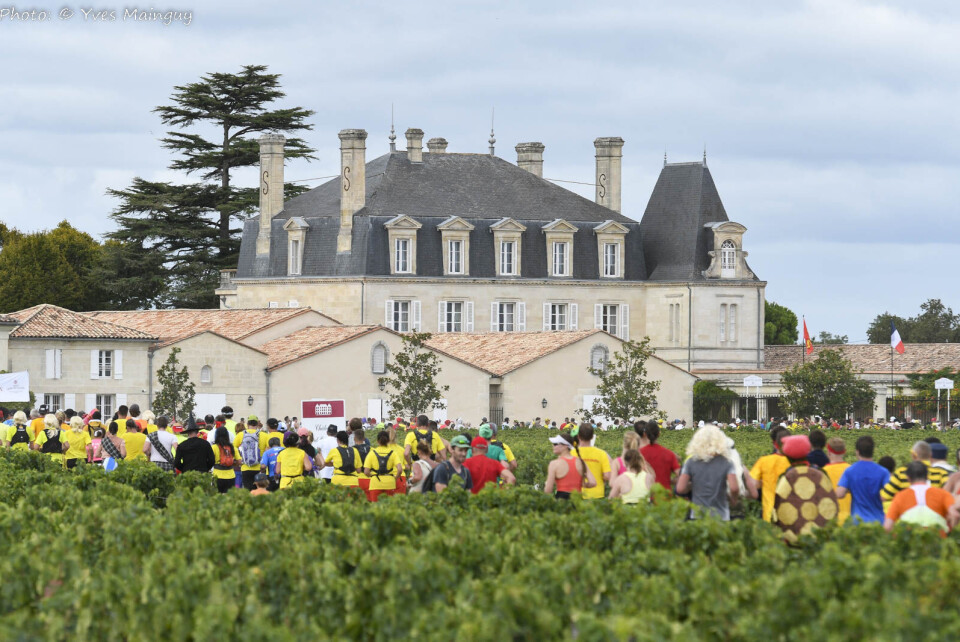-
This self-service wine vending machine has been approved for French roadsides
Innovative machines offer convenient wine access while adhering to alcohol laws
-
Understand the basics of French wine labelling
Why are French wines labelled as Bordeaux or Burgundies, and not Cabernet or Malbec? Jonathan Hesford explains
-
Myths and facts about France's winemaking terroir
Expert vigneron shares the truth about how soil and locale affect wines
A marathon with wine and 4 other unusual sporting events in France
The Marathon du Médoc, sometimes called the longest race in the world, features 23 wine stops, orchestras, oysters and steak over 43 kilometres

The Marathon du Médoc may look like a regular marathon at first sight: 42 kilometres long, through 60 beautiful vineyards of the Bordeaux region.
What makes this race special though is that runners can drink wine instead of water, with each of the 23 stations accompanied by a live orchestra. There is also an oyster tasting stop at the 38th kilometre and a steak tasting stop at the 39th.
It is sometimes nicknamed the ‘longest race in the world’ as runners are often tipsy for most of it and full of oysters and steak on the final stretch.
It is also usual for runners to wear extravagant costumes, with a new theme given every year. For the last edition, on September 2, the theme was ‘gastronomy’ so runners came dressed as cakes, chefs and even sausages.
Every year, the limit of 8,500 participants is reached, with runners from across the world. In 2023, French marathon runner Freddy Guimard won for the 4th time.
The Marathon du Médoc is far from the only unusual sport with a large following in France. Here are 4 other disciplines that stand out from the rest.
1. Choule
Choule or 'la soule', is considered the ancestor of modern football and, by extension, rugby.
Choule is still practised in Normandy in two versions, one with a stick, similar to field hockey, and one without, similar to football.
We answered a reader question about it in 2022, going in depth on its history and how it is played today.
Although the game nearly died out during World War Two, enthusiasts are trying to keep the sport alive; Normandy hosts a yearly ‘championnat de choule’ with several teams participating.
2. Trollball
A new game invented in 1995 in Quebec, trollball quickly made its way to France.
First introduced by Canadian ‘LARPers’ – a community of history and fantasy enthusiasts who like to roleplay with armour and fake weapons – the game is a mix of rugby and sword fighting.
Players are equipped with foam swords and shields, and must place the ‘troll head’ (a ball) in the opposite team’s goal without getting hit.
Organisers describe trollball as more of a game than a sport because it is nearly impossible to referee. All participants are expected to behave fairly and recognise when they are hit.
The game is popular in Normandy, with a local club gathering over 20 aficionados every month.
3. Menhir throwing
Astérix, the comic strip hero, is a French cultural favourite. His friend Obelix is a menhir – celtic standing stone – sculptor, who also likes to throw them at people he dislikes.
Out of love for the comic books, the people of Guerlesquin in Brittany organise menhir throwing competitions every year on August 3.
The competition is divided into several categories for children, men and women, with roasted boar and ‘magic potion’ served afterwards.
The latest edition gathered 250 participants, who were unable to beat the record of 6.18 metres with a 25 kg menhir.
4. Square boules
Square boules was invented when players in the village of Haut-de-Cagnes discovered in 1979 that the flat area they used had been turned into a parking lot.
Since roads in the hilltop spot have inclines of up to 18%, playing regular boules became impossible - until Daniel Menneguerre came up with the idea of turning the balls into cubes.
The invention was featured on television and quickly became popular in high altitude villages. The creator says that because of the shape of the cubes, winning is ‘about 60% luck’.
As a result, players approach their games with a more relaxed, less competitive spirit. The annual square boules world championship in Cagnes-Sur-Mer gathered 555 players during its edition in August this year.
Read more:
From fox cubs to singing mayors: Five good news stories from France
History as 300-km race in France no one had finished gets first winner
Second sewage leak cancelled another try at Olympic trials in Seine
























